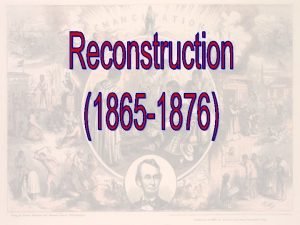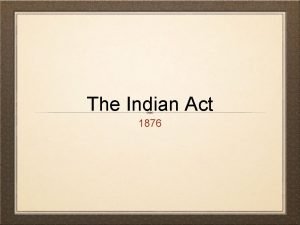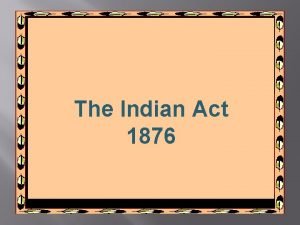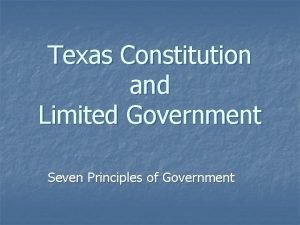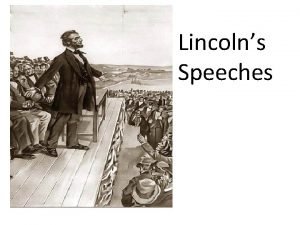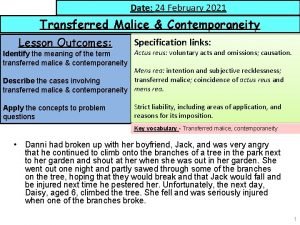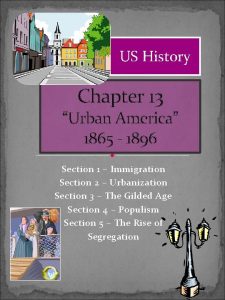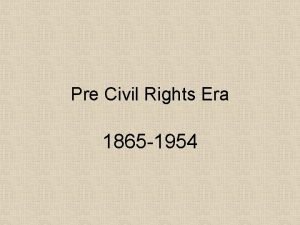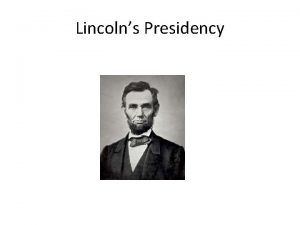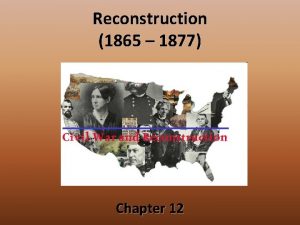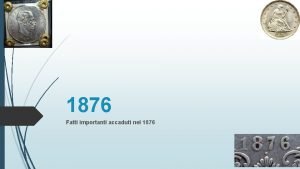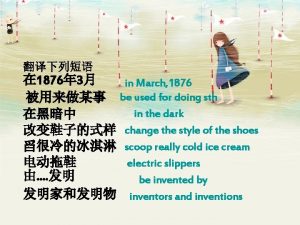1865 1876 President Lincolns Plan With Malice Toward


























- Slides: 26

1865 - 1876

President Lincoln’s Plan “With Malice Toward None, With Charity for All” « 10% Plan * When 10% of the voting population in the 1860 election had taken an oath of loyalty and established a government, it would be recognized. * Passage of the 13 th Amendment * Return the South quickly to the Union

13 th Amendment « Ratified in December, 1865. « Ends Slavery «Neither slavery nor involuntary servitude, except as punishment for crime whereof the party shall have been duly convicted, shall exist within the United States or any place subject to their jurisdiction.

Freedmen’s Bureau (1865) (General O. Howard) goal = Help African Americans adjust to their new freedom – Education • Founding of Howard University, Hampton Institute, Fisk University – Jobs • Encourage A. A. to sign contracts with planters • Attempt to ensure that the A. A. were not cheated – Land • Redistribute confiscated land (up to 40 acres) • President Johnson restored property to pardon Confederates

Freedmen’s Bureau (1865) « Carpetbaggers = Many former northern abolitionists who risked their lives to help southern freedmen. « Scalawags = Southerners who supported reconstruction

Freedmen’s Bureau Seen Through Southern Eyes Plenty to eat and nothing to do.

Freedmen’s Bureau School


President Andrew Johnson « Jacksonian Democrat. « Anti-Aristocrat. « White Supremacist. « Agreed with Lincoln that states had never legally left the Union. Damn the negroes! I am fighting these traitorous aristocrats, their masters!

President Johnson’s Plan (25%) « Offered amnesty upon simple oath to all except Confederate civil and military officers and those with property over $20, 000 (they could apply directly to Johnson) « must accept minimum conditions repudiating slavery, secession and state debts. « Named provisional governors in Confederate states and called them to oversee elections for constitutional conventions. 1. Disenfranchised certain leading Confederates. EFFECTS? 2. Pardoned planter aristocrats brought them back to political power to control state organizations. 3. Republicans were outraged that planter elite were back in power in the South!

Growing Northern Alarm! « Many Southern state constitutions fell short of minimum requirements. « Johnson granted 13, 500 special pardons. « Revival of southern defiance. BLACK CODES

Black Codes « Purpose: * * Guarantee stable labor supply now that blacks were emancipated. Restore pre-emancipation system of race relations. « Forced many blacks to become sharecroppers [tenant farmers].


Radical Plan for Readmission « Replace state governments with military rule. « New state constitutions that included ratification of the 13 th, 14 th, and 15 th Amendments « Military Reconstruction Act « Divide 10 “unreconstructed states” into 5 military districts « Punish the South!


th 14 Amendment « Ratified in July, 1868. * Citizenship granted to African Americans * Citizens granted equal protection under the law.

15 th Amendment « Suffrage extended to black males «The right of citizens of the United States to vote shall not be denied or abridged by the United States or by any state on account of race, color, or previous condition of servitude. « Women’s rights groups were furious that they were not granted the vote!

Reconstruction Acts of 1867 « Tenure of Office Act * The President could not remove any officials [esp. Cabinet members] without the Senate’s consent, if the position originally required Senate approval. § Designed to protect radical members of Lincoln’s government. § A question of the constitutionality of this law. § Used to impeach Andrew Johnson Edwin Stanton

President Johnson’s Impeachment « Johnson removed Stanton in February, 1868. « Johnson replaced generals in the field who were more sympathetic to Radical Reconstruction. « The House impeached him on February 24 before even drawing up the charges by a vote of 126 – 47!

The Senate Trial « 11 week trial. « Johnson acquitted 35 to 19 (one short of required 2/3 s vote).


Any credit leftover, become a Tenant farmer Sharecropping Sharecropper is given land seed by landowner (plots are small, so crop yields are low Pays off account with merchants (Crooked landowners charge unfair fines) Buys food and clothing on credit Plants crops (same crop year after year depletes the soil) Sells remaining crop at market (at the mercy of the market Harvests crops and gives landowner his share

The Political Crisis of 1877 « “Corrupt Bargain” Part II?

A Political Crisis: The “Compromise” of 1877 • Samuel Tilden vs. Rutherford B. Hayes • Disputed election • Southern Democrats would accept Hayes as President • Republicans pledged to remove military from the south

1876 Presidential Election

After Reconstruction • Rise of Jim Crow Laws – Literacy Tests – Poll Tax – Grandfather Clause • Segregation – Plessy vs. Ferguson – Separate but equal • Solid South – South will support the Democratic Party http: //www. ferris. edu/jimcrow. jpg
 With malice toward none meaning
With malice toward none meaning Lincolns 10% plan
Lincolns 10% plan Indian act definition
Indian act definition Indian act 1876
Indian act 1876 Texas constitution of 1876
Texas constitution of 1876 Purpose trust definition
Purpose trust definition Dewey decimal system
Dewey decimal system Ohp in media and information literacy
Ohp in media and information literacy John griffith london
John griffith london 6. testu iruzkina
6. testu iruzkina Lincolns election date
Lincolns election date Lincolns election
Lincolns election Lincolns speeches
Lincolns speeches Ducks unlimited checks
Ducks unlimited checks Doctrine of transferred malice
Doctrine of transferred malice Joking without malice
Joking without malice Lay aside all malice
Lay aside all malice Killing done with malice but without premeditation
Killing done with malice but without premeditation Urban america 1865 to 1896
Urban america 1865 to 1896 St helen’s smelting co v tipping (1865)
St helen’s smelting co v tipping (1865) The rise of industrial america 1865-1900
The rise of industrial america 1865-1900 The rise of industrial america 1865-1900
The rise of industrial america 1865-1900 1954-1865
1954-1865 Chapter 3 industrialization (1865 to 1901 answers)
Chapter 3 industrialization (1865 to 1901 answers) Becoming a world power 1865-1917
Becoming a world power 1865-1917 Impressionism characteristics
Impressionism characteristics Becoming a world power 1865-1917
Becoming a world power 1865-1917

